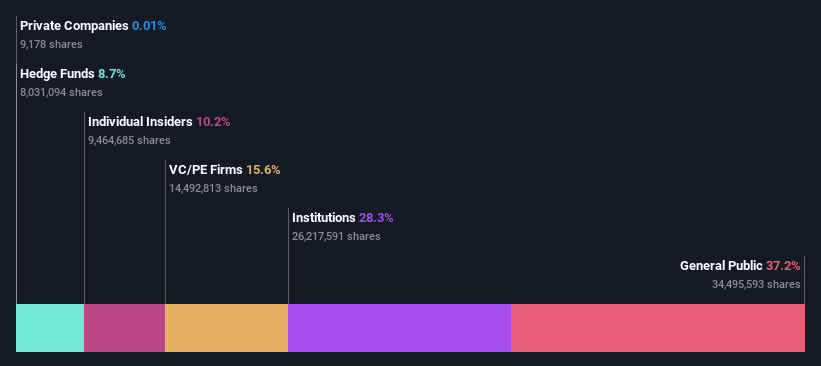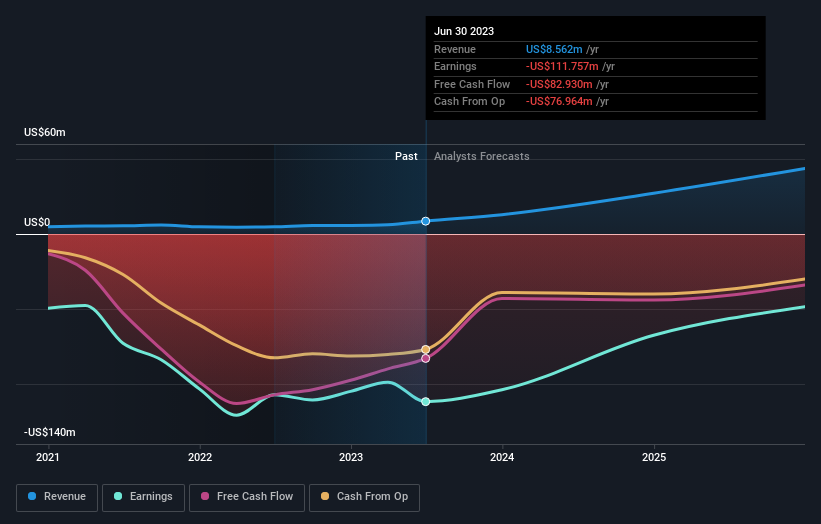- United States
- /
- Biotech
- /
- NasdaqGS:ABSI
Individual investors who hold 37% of Absci Corporation (NASDAQ:ABSI) gained 11%, institutions profited as well

Key Insights
- Significant control over Absci by individual investors implies that the general public has more power to influence management and governance-related decisions
- A total of 5 investors have a majority stake in the company with 51% ownership
- 10% of Absci is held by insiders
To get a sense of who is truly in control of Absci Corporation (NASDAQ:ABSI), it is important to understand the ownership structure of the business. We can see that individual investors own the lion's share in the company with 37% ownership. In other words, the group stands to gain the most (or lose the most) from their investment into the company.
Following a 11% increase in the stock price last week, individual investors profited the most, but institutions who own 28% stock also stood to gain from the increase.
In the chart below, we zoom in on the different ownership groups of Absci.
View our latest analysis for Absci

What Does The Institutional Ownership Tell Us About Absci?
Many institutions measure their performance against an index that approximates the local market. So they usually pay more attention to companies that are included in major indices.
We can see that Absci does have institutional investors; and they hold a good portion of the company's stock. This suggests some credibility amongst professional investors. But we can't rely on that fact alone since institutions make bad investments sometimes, just like everyone does. When multiple institutions own a stock, there's always a risk that they are in a 'crowded trade'. When such a trade goes wrong, multiple parties may compete to sell stock fast. This risk is higher in a company without a history of growth. You can see Absci's historic earnings and revenue below, but keep in mind there's always more to the story.

It looks like hedge funds own 8.7% of Absci shares. That's interesting, because hedge funds can be quite active and activist. Many look for medium term catalysts that will drive the share price higher. The company's largest shareholder is Phoenix Venture Partners LLC, with ownership of 16%. With 15% and 9.3% of the shares outstanding respectively, FMR LLC and Sean McClain are the second and third largest shareholders. Sean McClain, who is the third-largest shareholder, also happens to hold the title of Member of the Board of Directors.
On looking further, we found that 51% of the shares are owned by the top 5 shareholders. In other words, these shareholders have a meaningful say in the decisions of the company.
Researching institutional ownership is a good way to gauge and filter a stock's expected performance. The same can be achieved by studying analyst sentiments. Quite a few analysts cover the stock, so you could look into forecast growth quite easily.
Insider Ownership Of Absci
While the precise definition of an insider can be subjective, almost everyone considers board members to be insiders. Management ultimately answers to the board. However, it is not uncommon for managers to be executive board members, especially if they are a founder or the CEO.
Insider ownership is positive when it signals leadership are thinking like the true owners of the company. However, high insider ownership can also give immense power to a small group within the company. This can be negative in some circumstances.
Our information suggests that insiders maintain a significant holding in Absci Corporation. It has a market capitalization of just US$130m, and insiders have US$13m worth of shares in their own names. This may suggest that the founders still own a lot of shares. You can click here to see if they have been buying or selling.
General Public Ownership
The general public-- including retail investors -- own 37% stake in the company, and hence can't easily be ignored. While this size of ownership may not be enough to sway a policy decision in their favour, they can still make a collective impact on company policies.
Private Equity Ownership
With an ownership of 16%, private equity firms are in a position to play a role in shaping corporate strategy with a focus on value creation. Sometimes we see private equity stick around for the long term, but generally speaking they have a shorter investment horizon and -- as the name suggests -- don't invest in public companies much. After some time they may look to sell and redeploy capital elsewhere.
Next Steps:
While it is well worth considering the different groups that own a company, there are other factors that are even more important. Case in point: We've spotted 2 warning signs for Absci you should be aware of.
If you are like me, you may want to think about whether this company will grow or shrink. Luckily, you can check this free report showing analyst forecasts for its future.
NB: Figures in this article are calculated using data from the last twelve months, which refer to the 12-month period ending on the last date of the month the financial statement is dated. This may not be consistent with full year annual report figures.
New: Manage All Your Stock Portfolios in One Place
We've created the ultimate portfolio companion for stock investors, and it's free.
• Connect an unlimited number of Portfolios and see your total in one currency
• Be alerted to new Warning Signs or Risks via email or mobile
• Track the Fair Value of your stocks
Have feedback on this article? Concerned about the content? Get in touch with us directly. Alternatively, email editorial-team (at) simplywallst.com.
This article by Simply Wall St is general in nature. We provide commentary based on historical data and analyst forecasts only using an unbiased methodology and our articles are not intended to be financial advice. It does not constitute a recommendation to buy or sell any stock, and does not take account of your objectives, or your financial situation. We aim to bring you long-term focused analysis driven by fundamental data. Note that our analysis may not factor in the latest price-sensitive company announcements or qualitative material. Simply Wall St has no position in any stocks mentioned.
About NasdaqGS:ABSI
Absci
Operates as a data-first generative artificial intelligence (AI) drug creation company in the United States.
Flawless balance sheet low.
Market Insights
Community Narratives




